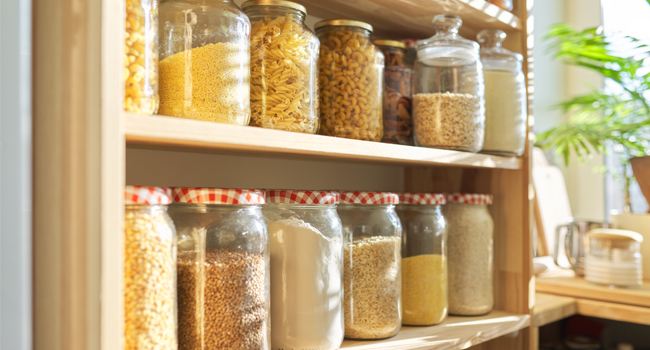
Sign Up for Updates
Connect
TOPICS
- Latest Blog
- Fiction
- Inspirational/Devotional
- Men's Christian Living
- Prophecy
- Women's Christian Living
- View All
ARCHIVES
8 Essential Foods You Should Be Storing at Home Right Now
Posted on Dec 21, 2023 Topic : Men's Christian Living, Women's Christian Living
Posted by : Melissa K. Norris

A well-stocked pantry in your dry storage, fridge, and freezer will not only be a blessing during hardships or emergencies, it will help reduce the temptation to spend more during each shopping trip on those items you tend to add to your cart whether you need them or not. When you are intentional about having extra supplies on hand, you can breeze right by those items and shelves and only buy from the planned list you have in hand.
Eight Foods to Store at Home
While having a well-stocked pantry is smart, there are some items we should always have at the ready when the need arises. Having a stocked deep freezer doesn’t do one any good if the power goes out for an extended period of time and all of that food is lost. Our goal is to have close to a year’s supply of our main staples on hand. These are the eight foods I believe you should be storing. I don’t include fruits and vegetables, as most of us can grow or harvest these at home or close to our homes.
1. Salt
Salt can be used to preserve food as well as flavor dishes. I put salt at the top of the list because most of us don’t have a way to get salt where we live, except at the store. We can all grow our own herbs, but most people do not have a naturally occurring salt source in the vicinity of their home. Store salt in a dry area, as moisture will make it cake together. If this happens, you can spread it out on a rimmed baking sheet lined with parchment paper. Depending on the time of year and your climate, you can use a warm sunny windowsill, or for those of us who live where sunlight can be scarce, preheat your oven to 250°F. Place the salt in the oven and then turn off the oven. Leave it in for 10 minutes, stir, and place it back in if needed.
2. Fat
Fruits and vegetables are part of a well-balanced diet, but our bodies require a certain amount of fat in order to function. We need fat for cooking and baking. I use butter, lard, coconut oil, and olive oil. Keep your fat source out of the heat and light. I put extra butter and lard in the freezer.
3. Wheat berries
You’ll see flour on lots of food storage lists, but quite frankly, flour is not meant for long-term storage. It will go rancid and can also be a home for pests. Wheat berries and other forms of grain will store for years. Not only can they be ground into flour, but they can also be soaked and cooked into a cereal. We use about 100 pounds of wheat berries a year. I use hard white wheat and spelt as our primary type of wheat berries. Store wheat berries in a cool and dry location.
4. Honey
Honey is a nonperishable food. Raw honey is excellent for eating, cooking, and medicinal purposes. You can make a ginger-infused honey for medicinal purposes during cold and flu season. Honey is also excellent for baking. If honey hardens or forms crystals, simply place the container in hot water. Plus, honey just plain tastes good. I love to swirl it in my coffee. Store honey out of direct sunlight.
5. Sugar
Sugar is needed in baking and also in canning homemade jams and jellies. However, I don’t use regular processed white sugar. I use organic evaporated cane sugar, and all my jam and jelly recipes in this book use about a quarter of the sugar most recipes call for. Store sugar in a dry place in a pest-proof container.
6. Dried beans
Dried beans are not only inexpensive and easy to store, but they have huge nutritional value. Beans can be used in multiple dishes and should be stored in a dark, cool, and dry place.
7. Oatmeal
Oatmeal is inexpensive and can be used for cereal, in baked goods, or even ground up into flour. It contains fiber and is easy to flavor with seasonal fruits and spices. We have oatmeal for breakfast at least once a week, if not more. Oatmeal is excellent with just cinnamon, a pat of butter, and a smidgen of sugar. We add peaches, blueberries, raisins, and other fruits as they come into season. Store oatmeal in a dry place.
8. Coffee
Most of us do not have a source of coffee available to us other than purchasing it. If you’re a tea drinker, then stock up on your teas. But I am a coffee lover. While we could live without coffee, I’d rather have it on hand. Does anyone else just open the canister of coffee and take a big whiff? Whole coffee beans will store much longer than ground coffee and should be stored in a dry and dark area.

Read more in The Made-from-Scratch Life by Melissa K. Norris

